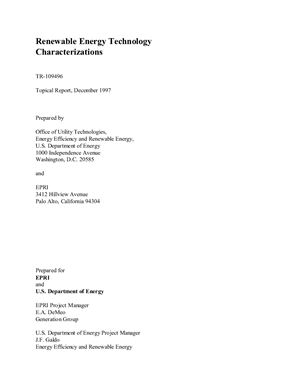Topical Report Prepared by Office of Utility Technologies, Energy
Efficiency and Renewable Energy and EPRI, 1997. - 283 pages.
An increasing national interest in the use of renewable energy for electricity generation has
stimulated a need for carefully prepared data on present and projected costs and performance of current and emerging renewable technology options. This document was prepared jointly by the U.S. Department of Energy and EPRI to address this need. It represents a consensus perspective on 12 different configurations of biomass, geothermal, photovoltaic, solar thermal, and wind technologies. It also provides data on battery storage systems for use in conjunction with renewable energy systems. In addition, various approaches to analyzing project financial
attractiveness are presented. This document is designed for use by electric-utility and powerproject planners, energy policy analysts, and technology R&D planners.
Renewable energy technologies span the range from developmental to commercially available. Some can make significant contributions now to electricity supply with zero or reduced environmental emissions. This report describes the technical and economic status of the major emerging renewable options and offers projections for their future performance and cost.
Background
Since 1989, the U.S. Department of Energy (DOE) has been developing descriptions of the renewable power technologies for inteal program planning and support purposes. Similarly, EPRI has maintained an ongoing perspective on these technologies, and has addressed status and projections for a number of them in its Technical Assessment Guide, TAG? . In late 1996, EPRI and DOE's Office of Utility Technologies embarked on an effort to develop a consensus document on the status, developmental needs, and outlook for these technologies. This effort has been carried out through most of 1997, culminating in this jointly prepared document.
Objective
To provide an objective assessment and description of the renewable power technologies, including current capabilities and future potential, for use by the electricity industry and energy and policy analysts and planners.
Approach
Building on the best available information and experience from many years of direct involvement in the development and assessment of renewable energy technologies, experts from DOE, its national laboratories, and support organizations prepared characterizations of the major renewable technologies. EPRI technical staff in the area of renewables and selected outside reviewers subjected these characterizations to an in-depth review and discussed them at length in two technical workshops. The characterizations were then revised to reflect discussions at and subsequent to the workshops, resulting in this consensus document. In some cases, EPRI staff contributed material for introductory sections. Results These technology characterizations provide descriptions of the leading renewable technologies and discussions of current capabilities in terms of system performance and cost. The report provides projections of future performance and costs based on the assumption of continuing development support and the
successful resolution of unresolved issues. It also discusses the issues and activities necessary to address these unresolved issues. Costs and cost estimates are presented in terms that allow individuals to perform their own financial analyses using methods appropriate to their own situations and needs. In addition, levelized energy cost estimates are offered.
An increasing national interest in the use of renewable energy for electricity generation has
stimulated a need for carefully prepared data on present and projected costs and performance of current and emerging renewable technology options. This document was prepared jointly by the U.S. Department of Energy and EPRI to address this need. It represents a consensus perspective on 12 different configurations of biomass, geothermal, photovoltaic, solar thermal, and wind technologies. It also provides data on battery storage systems for use in conjunction with renewable energy systems. In addition, various approaches to analyzing project financial
attractiveness are presented. This document is designed for use by electric-utility and powerproject planners, energy policy analysts, and technology R&D planners.
Renewable energy technologies span the range from developmental to commercially available. Some can make significant contributions now to electricity supply with zero or reduced environmental emissions. This report describes the technical and economic status of the major emerging renewable options and offers projections for their future performance and cost.
Background
Since 1989, the U.S. Department of Energy (DOE) has been developing descriptions of the renewable power technologies for inteal program planning and support purposes. Similarly, EPRI has maintained an ongoing perspective on these technologies, and has addressed status and projections for a number of them in its Technical Assessment Guide, TAG? . In late 1996, EPRI and DOE's Office of Utility Technologies embarked on an effort to develop a consensus document on the status, developmental needs, and outlook for these technologies. This effort has been carried out through most of 1997, culminating in this jointly prepared document.
Objective
To provide an objective assessment and description of the renewable power technologies, including current capabilities and future potential, for use by the electricity industry and energy and policy analysts and planners.
Approach
Building on the best available information and experience from many years of direct involvement in the development and assessment of renewable energy technologies, experts from DOE, its national laboratories, and support organizations prepared characterizations of the major renewable technologies. EPRI technical staff in the area of renewables and selected outside reviewers subjected these characterizations to an in-depth review and discussed them at length in two technical workshops. The characterizations were then revised to reflect discussions at and subsequent to the workshops, resulting in this consensus document. In some cases, EPRI staff contributed material for introductory sections. Results These technology characterizations provide descriptions of the leading renewable technologies and discussions of current capabilities in terms of system performance and cost. The report provides projections of future performance and costs based on the assumption of continuing development support and the
successful resolution of unresolved issues. It also discusses the issues and activities necessary to address these unresolved issues. Costs and cost estimates are presented in terms that allow individuals to perform their own financial analyses using methods appropriate to their own situations and needs. In addition, levelized energy cost estimates are offered.

